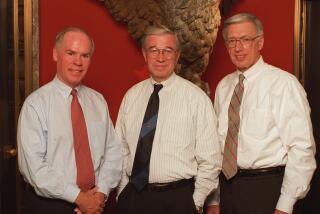Reader’s Digest CEO Schadt Quits Abruptly
- Share via
James P. Schadt resigned abruptly after three disappointing years at the helm of Reader’s Digest Assn. Inc., and the man he succeeded was brought out of retirement to replace him.
George Grune, 68, who presided over Reader’s Digest for the decade that saw it become a publicly owned company, said he is pleased to fill in while the company looks for a permanent successor.
The company offered no reason for the 59-year-old Schadt’s resignation in an announcement Monday, other than to say it was a mutual decision by the former soft drink executive and the Reader’s Digest board. But analysts suspect that Schadt was forced out.
The company’s earnings have declined, its revenue has stagnated and its stock price has plummeted even as the overall market for stocks has climbed.
Last month, the company halved its dividend.
“The financial results have been extremely disappointing,” said Peter Appert, who follows the company for Alex. Brown & Sons in San Francisco. “The board lost confidence in his ability to turn things around.”
Appert said there was “no question” Schadt had been forced out and said the only question was why it took so long.
On Wall Street, investors bid up Reader’s Digest stock. On the New York Stock Exchange, the company’s Class A shares gained $3.38 to close at $28.25--a gain of 13.6% but well below its $42.50 price near the start of Schadt’s term as chief executive in 1994.
Begun in 1922, the magazine, known for its condensed articles from other publications, sells nearly 27 million copies a month, making it the world’s largest general-interest periodical.
Some analysts say they don’t know what any new leader can do to reverse course for the company whose product appeals primarily to a shrinking base of older readers.
The company, based in Pleasantville, N.Y., maintains a huge marketing database that it uses to sell musical recordings, videos and books. It also owns several specialty magazines, including Family Handyman, New Choices, Walking and American Health for Women.
But the company has found that fewer people are responding to its promotional offers despite years of work on timing its offers better.
In announcing on July 11 that it would cut its dividend in half, the company said it expected charges for inventory write-downs in the April-June quarter “due largely to the unusually high difference between actual customer response” to its mailings and what it had expected.
Grune stepped down as chief executive in 1994 and as chairman a year later. He was replaced in both posts by Schadt, who had joined Reader’s Digest Assn. in 1991 as president after heading the Cadbury Schweppes worldwide beverage business.
Schadt, who did not return phone calls Monday, had also held senior executive posts at Sara Lee, PepsiCo and Procter & Gamble.
He tried to steer Reader’s Digest into alliances with television programmers to broaden the company’s appeal and to include a wider selection of musical offerings.
More to Read
Inside the business of entertainment
The Wide Shot brings you news, analysis and insights on everything from streaming wars to production — and what it all means for the future.
You may occasionally receive promotional content from the Los Angeles Times.










